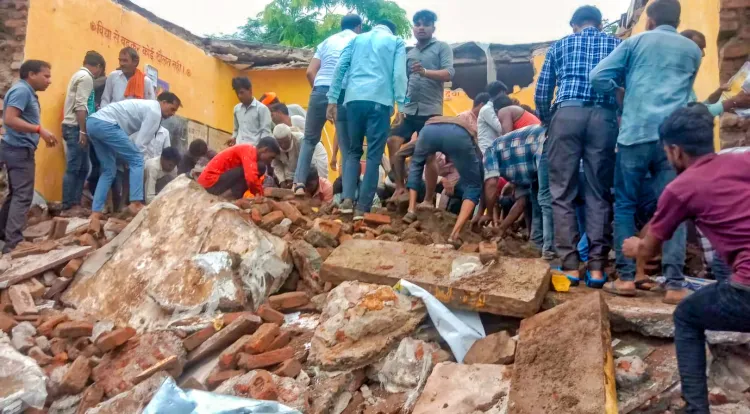Rajasthan HC Issues Notice to Chief Secretary and Officials: What Will Be the Accountability for the Jhalawar School Tragedy?

Synopsis
Key Takeaways
- Judicial intervention emphasizes the need for accountability in school infrastructure.
- Independent audits of school buildings are to be conducted.
- Significant lapses in safety protocols have been identified.
- The Right to Education Act mandates a secure learning environment.
- Parents and students will have a platform to report unsafe conditions.
Jaipur, July 31 (NationPress) The Rajasthan High Court has issued a notice to senior officials regarding the tragic roof collapse at a school in Jhalawar, claiming the lives of seven young students and demanding accountability. Justice Sameer Jain's bench has sent notices to the Union Education Secretary, the Chief Secretary of Rajasthan, and other relevant officials, insisting on responsibility for this grave incident.
The court remarked that if the safety measures and formalities now under discussion had been implemented in a timely manner, the precious lives lost could have been preserved.
Furthermore, the psychological trauma endured by other children present during the incident might have been avoided.
The court highlighted that under the Right to Free and Compulsory Education (RTE) Act, the government bears a constitutional duty to ensure a safe and supportive educational environment for children.
According to RTE regulations, it is obligatory for the Public Works Department (PWD) to inspect school facilities to verify compliance with safety standards.
However, the Jhalawar disaster has unveiled significant shortcomings, including the use of substandard materials and a blatant disregard for established norms by the PWD, which were identified as primary factors contributing to the tragedy.
In light of this, the court has called for immediate corrective actions, directing that an independent evaluation of all government school buildings—especially in rural and remote regions—be executed. This audit must evaluate the structural safety and provide a comprehensive report on the current condition of educational infrastructure across the state.
Additionally, the High Court has requested a thorough status report on the Jhalawar incident, which should include findings from the ongoing investigation, identification of responsible parties, and actions taken against them.
This judicial intervention aims to drive the administration towards increased accountability and proactive measures to avert such preventable tragedies in the future.
Previously, Justice Anoop Dhand's bench had also sought a comprehensive report from both the central and state governments, expressing concern over the alarming state of school infrastructure.
The court conveyed strong dissatisfaction regarding the educational infrastructure, despite the government allocating 6 percent of its total budget to the education sector.
“Even with this level of investment, infrastructure development remains inadequate,” the court stated.
Citing a recent survey, the court pointed out that 22 percent of school buildings across 12 states, including Rajasthan, are in a dilapidated state, with 31 percent showing visible structural defects.
In Rajasthan specifically, 32 percent of schools lack electricity, 9 percent do not have access to drinking water, and another 9 percent lack adequate boys’ toilet facilities.
The court mandated both central and state authorities to perform an exhaustive survey of all school buildings to evaluate their structural integrity.
It also proposed the establishment of an online portal and district-level websites where parents and students can report unsafe or crumbling school buildings, whether government or private.
The court further recommended creating a dedicated complaint resolution mechanism to address such issues.
Accountability must be enforced against those culpable for poor construction practices. In the event of a disaster, the cost of construction should be reclaimed from contractors, and both departmental and criminal proceedings should be pursued against the responsible parties.
This judicial action follows the shocking Jhalawar incident, where a school building collapsed, leading to the tragic loss of seven children. The matter has also reverberated in the Lok Sabha, invoking protests and calls for stringent action from opposition MPs.
The High Court’s involvement underscores the urgent necessity for structural audits and accountability in school infrastructure to safeguard students nationwide, according to officials.









